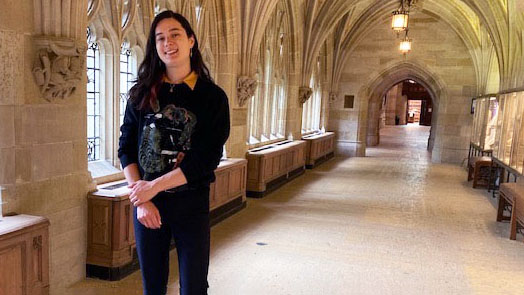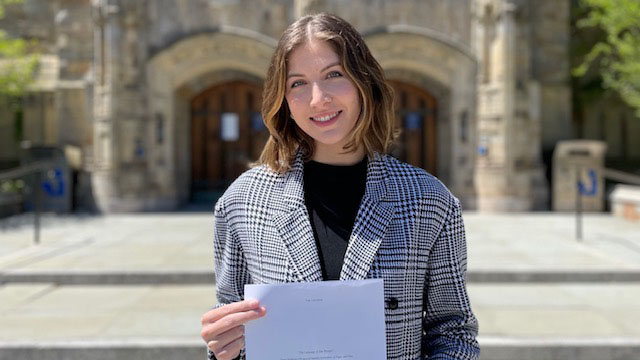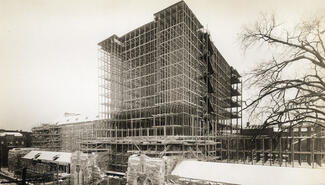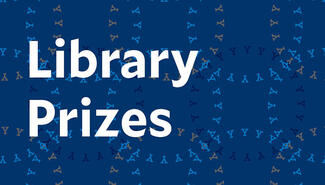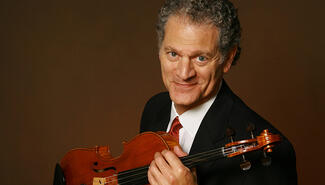Kaplan Prize recognizes seniors’ research in Yale Library collections
Three Yale College seniors—Sam Battles, Sarah Gannett, and Madeleine Stern— have been awarded Yale University Library’s Diane E. Kaplan Senior Essay Prize. The award recognizes these students’ excellent use of research materials from the library’s diverse collections and the high quality of their writing.
Formerly limited to senior essays based on research in the collections of Manuscripts and Archives, the prize was expanded this year to include essays based on research in any Yale Library special collection. In response to the range and quality of essays submitted, the library chose to award the prize to three students this year.
Sam Battles (Davenport College)
Battles wrote his essay “Paper Sons and Chosen Families: Blurry Archives and Non-Biological Kinship in the Chong Family Album” for his program in Ethnicity, Race & Migration. The essay centers on a photo album in the Beinecke Library collections that belonged to the Chong family, members of a Chinese American community living in San Francisco, California, circa 1915. Battles examines the content of the album but also its layout and sequencing to ask questions about Asian identity, family structure, and immigration policies in that era. “I had little information with which to interpret its contents,” he writes, noting that marginalized people are often missing from the archives. “Speculation and imagination are necessary to bring the aspirations and emotions back to archival subjects.” Battle’s faculty advisor was Laura Wexler, Professor of American Studies, Professor of Women’s, Gender, and Sexuality Studies, and Co-Chair of the Women’s Faculty Forum at Yale. Read Sam Battles’ essay.
Sarah Gannett (Davenport College)
Gannett based her essay “‘A Cascade of Shifts in the Brain’: Kay Ryan’s Poetics,” on the papers of contemporary poet Kay Ryan, also held in the Beinecke Library collections. Working with Ryan’s journals and other unpublished writings, Gannett put these materials “in conversation” with the poet’s work, “to complement and expand on the concerns of her brief, rapid, and varied lyrics.” Gannet notes that Ryan is a “much-rewarded, but underappreciated” two-term poet laureate, and this essay is the first to use Ryan’s archives to analyze her poetic works. “Reading her poetry alongside her papers,” Gannet explains, “builds a critical approach to her work congruous with the poet’s own conviction that ‘it is not in isolation that a thing is most eloquent.’” Gannett worked with faculty advisor Kari Roffman, senior lecturer in Humanities, English, and American Studies and the Associate Director of Public Humanities at Yale University, and she submitted this work for her degree in the Humanities Program. Read Sarah Gannett’s essay.
Madeleine Stern (Pierson College)
For her degree in the American Studies Program, Stern submitted the essay “‘The Language of Our Dreams’: James Baldwin’s Project of Identity Formation on Paper and Film.” Her project explores unreleased film and audio recordings featuring the writer found in the Sedat Pakay Collection of the Yale Film Archive. Stern writes that, despite Baldwin’s celebrity—as a novelist, essayist, playwright, and activist—he rejected labels and continually longed for “self-creation and self-renewal.” His film appearances, Stern adds, provide insights into his “lifelong process of identity formation.” The essay examines two short documentary films featuring Baldwin (one directed by Sedat Pakay MFA ’68) that explore themes of “exile, race, and what it means to bear witness.” Stern worked with advisor Melissa Barton, Curator, Yale Collection of American Literature. Read Madeleine Stern’s essay.
Students received their awards at their residential commencement ceremonies. Each received $500 and publication on EliScholar, where previous Kaplan Prize essays have been downloaded more than 21,000 times since 2015.
The Kaplan Prize is one of three senior essay prizes awarded by the library each year. The Kaplan Prize was established in 2003 to honor the memory of Diane Kaplan (1947–2012), who worked as an archivist in Manuscripts and Archives for more than thirty-five years and whose contributions aided and inspired generations of researcher and colleagues. This year’s award committee members were Anna Arays, librarian for Slavic and East European Studies, and, from Manuscripts and Archives, Jennifer Coggins, archivist for collection development; Bill Landis, associate director for public services; and Mike Lotstein, University archivist.
—By Deborah Cannarella
